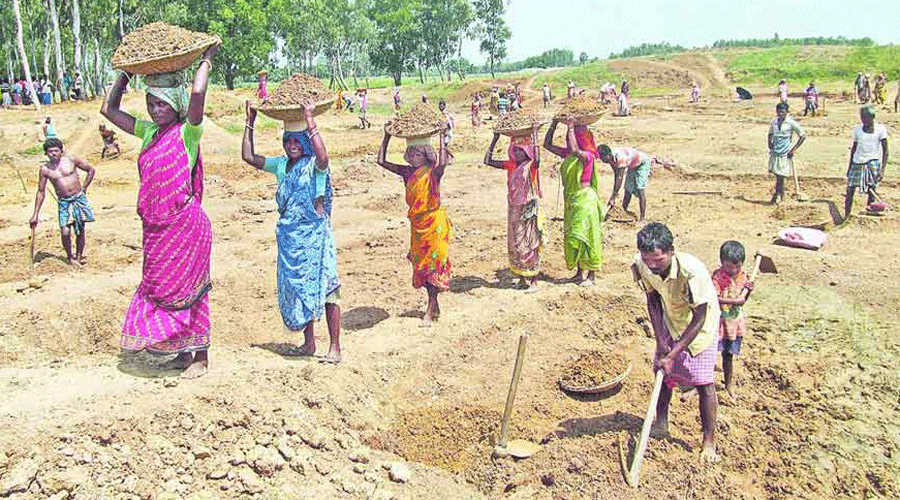This summer, Gaudsahi village under Kapileswarpur gram panchayat in Odisha’s Puri district began renovating the village pond under the Mahatma Gandhi National Rural Employment Guarantee Act.
About 20 workers would come to the work site every day, get photographed carrying basketfuls of soil or digging the earth, and then leave without doing any real work. The photo would be uploaded on an app to mark their “attendance”.
The work would be done with JCB machines by a contractor hired by the gram panchayat. When the wages arrived, the workers would keep about 30 per cent and hand over the rest to the panchayat to pay the contractor, villagers said.
Everyone would be happy, including the workers who would rather work for market wages (Rs 350 a day in coastal Odisha for unskilled labour) than the rural job scheme wages (Rs 222 a day), while earning a little “extra” on the side by scamming the welfare programme.
“Also, many workers are uninterested in physical labour in the coastal areas. They make a ‘guest appearance’ and the work is done by contactors and machines,” a villager told The Telegraph.
However, the scam deprives villagers who cannot easily get work and genuinely need NREGA jobs and wages.
Besides, contractors and machines are not allowed under the job scheme, which provides for paid, unskilled work for up to 100 days a year to every rural household. Its objective is to provide as much work as possible to households in the lean season.
Yet, contractors and machines are often seen at NREGA worksites, says a survey by Azim Premji University, released on Friday.
The survey report, “Employment guarantee during Covid 19: Role of MGNREGA in the year after 2020 lockdown”, covered the scheme’s performance during the pandemic in eight blocks: Phulparas and Chhatapur in Bihar, Bidar and Devadurga in Karnataka, Khalwa and Ghatigaon in Madhya Pradesh, and Wardha and Surgana in Maharashtra. (The Odisha village was covered directly by this newspaper.)
Unlike Gaudshahi in Odisha, in many of the surveyed villages the workers did not know that contractors were doing the work in their name and were appropriating their entire wages in connivance with local officials.
The survey, which found that a huge number of households did not get work under the scheme, was told by villagers that one major reason was that “the contractors” did not inform them about the work.
“As per the Act, contractors are banned in MGNREGA. But the study reveals high prevalence of contractors especially in the two blocks of Karnataka, where nearly half to two-thirds of the households have picked this reason,” the report says.
“And, nearly half the households in the low-performing block of Bihar (Phulparas) have alluded to contractors not informing them as a key reason for not getting enough work.”
The other reason the workers cited for not getting work was the lack of adequate projects being sanctioned.
The report said the vast majority of households reported a loss of income, of 30 to 50 per cent, during the Covid year (financial year 2020-21).
Across the eight blocks, roughly 39 per cent of the job card-holding households interested in NREGA work did not get a single day’s work during the Covid year.
This was because of the very high demand during the pandemic, with its total and partial lockdowns and travel restrictions.
According to official data, the total sum spent on labour wages in the surveyed blocks in the Covid year was Rs 152.68 crore. The survey team has estimated that to meet the true demand for NREGA work in these blocks, the labour budget should have been three times higher at Rs 474.27 crore.
The survey has recommended doubling the number of field functionaries, who visit the work sites and measure the work done, to reduce the scope for corruption.
The survey, conducted in November-December 2021, covered 2,000 households.










